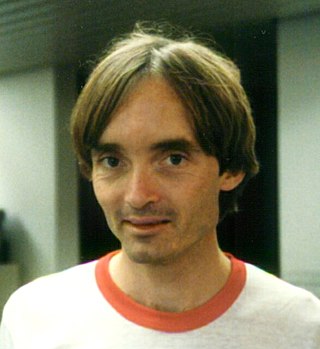Edwin Crawford Kemble was an American physicist who made contributions to the theory of quantum mechanics and molecular structure and spectroscopy. During World War II, he was a consultant to the Navy on acoustic detection of submarines and to the Army on Operation Alsos.
Robijn F. Bruinsma is a theoretical physicist and is Professor of Physics at the University of California, Los Angeles and Chair of the Department of Theoretical Physics for the Life Sciences at Leiden University. He is a specialist in the theory of condensed matter.
Tom C. Lubensky is an American physicist. He is currently the Christopher H. Browne Distinguished Professor at the University of Pennsylvania, where he was Mary Amanda Wood professor of physics (1998–2009) and chair of the Department of Physics and Astronomy.

Priyamvada (Priya) Natarajan is a professor in the departments of astronomy and physics at Yale University. She is noted for her work in mapping dark matter and dark energy, particularly with her work in gravitational lensing, and in models describing the assembly and accretion histories of supermassive black holes. She authored the book Mapping the Heavens: The Radical Scientific Ideas That Reveal the Cosmos.
David I. Kaiser is an American physicist and historian of science. He is Germeshausen Professor of the History of Science at the Massachusetts Institute of Technology (MIT) and a full professor in MIT's department of physics. He also served as an inaugural associate dean for MIT's cross-disciplinary program in Social and Ethical Responsibilities of Computing.

Robert H. Brandenberger is a Swiss-Canadian theoretical cosmologist and a professor of physics at McGill University in Montreal, Quebec, Canada.
Timothy Maurice Paul Tait is a Canadian-American particle physicist known for his contributions to the theoretical physics and particle physics, particularly in the field of dark matter. He is currently a professor in the Department of Physics and Astronomy at the University of California, Irvine.
Gabriel Kotliar is a physicist at Rutgers University in the United States, where he is Board of Governors Professor of Physics.
Marc Kamionkowski is an American theoretical physicist and currently the William R. Kenan, Jr. Professor of Physics and Astronomy at Johns Hopkins University. His research interests include particle physics, dark matter, inflation, the cosmic microwave background and gravitational waves.
Bryan Ronald Webber, FRS, FInstP is a British physicist and academic. He was a Fellow of Emmanuel College, Cambridge from 1973 to 2010, and Professor of Theoretical Physics at the University of Cambridge from 1999 to 2010. He has been awarded the Dirac Medal by the Institute of Physics, the Sakurai Prize by the American Physical Society and the High Energy and Particle Physics Prize by the European Physical Society.
Ma Chung-pei is an astrophysicist and cosmologist. She is the Judy Chandler Webb Professor of Astronomy and Physics at the University of California, Berkeley. She led the teams that discovered several of largest known black holes from 2011 to 2016.
Sara Imari Walker is an American theoretical physicist and astrobiologist with research interests in the origins of life, astrobiology, physics of life, emergence, complex and dynamical systems, and artificial life. Walker is deputy director of the Beyond Center for Fundamental Concepts in Science at Arizona State University (ASU), associate director of the ASU-SFI Center for Biosocial Complex Systems and an associate professor at ASU. She is a co-founder of the astrobiology social network SAGANet, and on the board of directors for Blue Marble Space, a nonprofit education and science organization. As a science communicator, she is a frequent guest on podcasts and series, such as Through the Wormhole with Morgan Freeman.
Robert R. Caldwell is an American theoretical physicist and professor of physics and astronomy at Dartmouth College. His research interests include cosmology and gravitation. He is known primarily for his work on theories of cosmic acceleration, in particular dark energy, quintessence, and the Big Rip scenario.
Elizabeth H. Simmons is an American theoretical physicist, and Executive Vice Chancellor at University of California San Diego. Formerly, she was a distinguished professor of physics at Michigan State University, the dean of Lyman Briggs College, and the associate provost for faculty and academic staff development. She has also held positions at Harvard University and Boston University. Simmons is married to fellow physicist, R. Sekhar Chivukula. Together they have two children.
Risa H. Wechsler is an American cosmological physicist, Professor of Physics at Stanford University, and Professor of Particle Physics and Astrophysics at SLAC National Accelerator Laboratory. She is the director of the Kavli Institute for Particle Astrophysics and Cosmology.
Nina Marković is a Croatian-American physicist. Her work focuses on quantum transport in low-dimensional systems, superconductivity, nanostructures, and quantum computing. She received a Sloan Research Fellowship in 2004. Marković worked at Delft University of Technology, Harvard University, and Johns Hopkins University before joining the Goucher College Department of Physics and Astronomy in 2015.

Vijay Balasubramanian is a theoretical physicist and the Cathy and Marc Lasry Professor of Physics and Astronomy at the University of Pennsylvania. He has conducted research in string theory, quantum field theory, and biophysics. He has also worked on problems in statistical inference and machine learning.

Zlatko Boško Tešanović was an Yugoslav-American theoretical condensed-matter physicist, whose work focused mainly on the high-temperature superconductors (HTS) and related materials.
Catherine Kallin is a Canadian theoretical quantum condensed matter physicist whose research topics have included spin wave theory, the quantum Hall effect, frustrated antiferromagnets, chirality in superconductors, and high-temperature superconductivity. She is a professor emerita of physics and astronomy at McMaster University.
Jesse Thaler is an American particle physicist who is a professor at the MIT Department of Physics. He was named director of the NSF Institute for Artificial Intelligence and Fundamental Interactions (IAIFI) upon its creation in August 2020.



